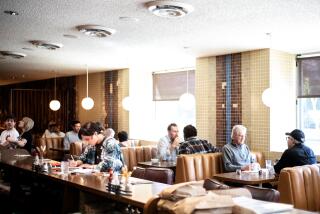Doesn’t a human’s hunger trump hassle?
At a time when record numbers of people are losing their homes, unemployment is rising and a growing number of families are in need, California caterers, hotels and restaurants throw out roughly 1.5 million tons of perfectly good food every year, according to the state Integrated Waste Management Board.
And you know what? If you’re the one springing for that hotel banquet, wedding party or corporate event, you have the right to insist that any leftovers be donated to charity.
In fact, a 1996 federal law specifically shields people from liability for any problems resulting from food donations -- if someone gets sick, say.
So why is so much food ending up in the dumpster?
“It’s not the liability that caterers are worried about,” said Michael Flood, chief exec of the Los Angeles Regional Food Bank. “It’s the logistics.”
Simply put, it’s often too much hassle for caterers and hotels to arrange for leftover food to be given to a homeless shelter or soup kitchen. So they toss it in the trash.
“They are literally throwing food away,” said John Knapp, president of the Foodbank of Southern California. “Meanwhile we have 1.3 million children going to bed hungry every night. It makes no moral sense.”
State Sen. Jenny Oropeza (D-Long Beach) tried to take a small step toward remedying this last year with legislation that would have imposed the modest requirement that caterers inform clients they have the option of donating uneaten food to charity.
That bill, SB 1443, was shot down by the California Restaurant Assn., which argued that any such requirement would be troublesome for its members.
So now Oropeza is back with a new bill, SB 35, that she says is once again intended to remedy the problem of all that food going to waste.
And once again, the restaurant association is saying that if there’s anything in there that even smacks of a donation requirement for caterers -- or even just a requirement that clients be informed of their rights -- they’ll kill off this bill as well.
“The problem is making this a mandate,” said Lara Dunbar, the group’s senior vice president of government affairs. “This will expose people to breach-of-contract issues.”
Big deal, you’d think. With so many people going hungry, and with federal law already protecting food donors, what’s the harm in merely ensuring that party throwers know they can do some good with whatever’s left in the steam trays?
But Oropeza appears to be backing down. The language in her new bill isn’t final yet, and the legislation could still have some teeth, but I was left with the clear impression Tuesday that she wasn’t up for a fight.
“Politics is getting in the way of making this the best bill it could be,” Oropeza told me. “The reality is that the CRA is adamant about its point of view. Last time they were able to nuke my bill. Now instead of taking a big bite at the problem, we’ve decided to do it in smaller bites.”
Much smaller.
Rather than trying again for the donation-disclosure requirement, Oropeza said it’s possible her bill will focus only on creating a database of food banks and delivery services that can expedite food donations.
“We’re taking a less-aggressive approach, no question about it,” she said.
It’s unbelievably sad that the various parties in this equation can’t come together for a genuine solution. The only barrier to getting all that food to people who need it is a little effort on everyone’s part to make the appropriate arrangements.
“With a little advance planning, it’s something we can deal with,” said Al Rossi, gifts-in-kind manager for the Los Angeles Mission, which serves up to 1,800 meals a day to people in and around skid row. “We can arrange for a refrigerated truck to pick up food.”
The problem, he said, is that many caterers think it’s a waste of time to arrange post-event food donations and to coordinate with nonprofit groups to make such handoffs go smoothly.
That’s not to say they’re all so hardhearted. Along Came Mary Productions Inc. is among a handful of leading L.A. caterers that routinely make leftovers available to charity. “We’ve been doing it for 20 years,” said Bill Starbuck, the company’s executive chef.
Similarly, Joann Roth-Oseary, owner of the L.A. catering company Someone’s in the Kitchen, said she donates food to nonprofit groups and can’t understand why more caterers don’t do it.
“It’s very easy to discern the difference between right and wrong,” she said.
But Rossi at the L.A. Mission said progressive-minded caterers are the exception, not the norm. “I can’t tell you how many I hear about that throw away food,” he said. “It’s absolutely mind-boggling.”
And the need for donated food has never been greater, he said. Attendance at the L.A. Mission, as with most shelters and food pantries, has been growing as the impact of the recession has deepened.
“It’s not just homeless people coming to us now,” Rossi said. “It’s regular families that have lost their income. They’re not homeless. They’re just broke.”
I asked Oropeza how she felt about watering down her bill amid such troubles.
“This is the frustrating thing about being a legislator,” she replied. “You see a problem and you see a fix. But you have to do it in increments.”
Meanwhile, people go hungry.
“People go hungry,” Oropeza agreed. “It’s disgraceful.”
So do something about it.
--
David Lazarus’ column runs Wednesdays and Sundays. Send your tips or feedback to david.lazarus@latimes.com.
More to Read
Eat your way across L.A.
Get our weekly Tasting Notes newsletter for reviews, news and more.
You may occasionally receive promotional content from the Los Angeles Times.







